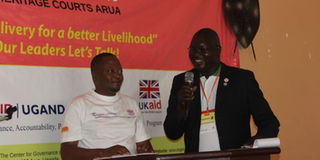Prime
4,000 get into drive to help Arua farmers on value chain

Mr Vincent Katungye Team leader CEGED and Akuma Moses Secretary chamber of commerce.
ARUA
A new initiative that seeks to help farmer producer associations in Arua increase production and aggregate production for better commercial returns and get especially the youths into agri-business was last week held.
After research by the local based Civil society organization Centre for Governance and Economic Development (CEGED), which is spearheading the initiative with the support from United States Agency for International Development (USAID) and UK AID, found that the district, consumes more than it produces, an issue that has led to leakage of the local revenue collections, since the residents have to buy foodstuffs from the neighboring districts of Masindi, Lira and Kiryandongo despite the district’s potential to produce its own food.
According to Mr Vincent Katungye, the team leader, CEGED – the initiative strives to address structural constraints affecting productivity of ten value chains of - cassava, honey, maize, beans, coffee, bananas, sim-sim, horticulture (tomatoes), goats and fruits and targets 4000 farmers organized in associations.
The project has so far reached out to 10 producer associations of 30 members each, in 5 sub-counties, with a pilot of 300 farmers reached.
“The spill over impact is expected to benefit over 400,000 farmers in Arua districts engaged in the targeted value chains including the second tier of the actors like produce dealers, transporters of produce, market tenders for collecting revenue, in puts dealers, and financial services providers like the banks,” Mr. Vincent Katungye said.
Mr Abdu Moses, the governance officer at CEGED who presented the findings during the forum of farmers and decision makers in the district last week, said during their research in communities, they discovered that sub county leaders fail to respond to demands of locals due to lack of resources.
“These sub counties can’t respond because they don’t have resources to respond and yet these resources are supposed to come from locals who are farmers by paying local revenue who have structural problems,” he said.

Ms. Eva Mastiko, the Chief of Party Governance for the USAID funded Accountability Participation and Performance program (GAPP) project.
The report observes that Arua district continues to consume more than it produces even in enterprises where it depends on its own supplies like bananas and fruits, the supplies are below average. ‘If we concentrated & buy cassava from Arua district for two weeks, our people will not have food for a year!’ Said Chairman, Mr Dada Arua main market
The study also revealed that “For every ten (10) jerycans of honey on the Arua market, six come from Congo” yet Arua is known to be the leading producer of quality honey in Uganda.
“We have not taken advantage of this naturally God given geographical strategic positioning” said Dramadri Michael, Chairman Etori Honey producer Association.
Dr Gordon Toa, the district production coordinator said: “This is an opportunity where we should open our eyes to see that there is market for all that we produce, what we are lacking is technical knowledge, we need people to get into commercial agriculture, we need to open up our land.”
He said what farmers need is quality seeds and planting materials but blamed the land fragmentation practice of locals which does not support commercial agriculture.
“We need to take advantage of the existence of these producer associations to deliver services like tractors since they are already organized units of production” said, Ms. Eva Mastiko, the Chief of Party Governance for the USAID funded Accountability Participation and Performance program (GAPP) project.
Arua Resident District Commissioner Peter Debele said services delivery for better livelihoods was a key area of focus for government.
“When you I go for my field monitoring I don’t see any serious gardens ready for planting apart from the small plots for plating tobacco,” Mr Debele, who officiated at the function said.
He lamented that the district has already procured 72 tonnes of maize seed for distribution but the challenge remains where are serious farmers with an acre of land and above. He also blamed the seed companies for selling fake seeds to the government programmes like operation wealth creation which taints the government’s image.
Mr Onesmus Otuma, a coffee farmer from Tendruonzi village Logiri Sub-county said farmers have the will to increase productivity but lacked access to agricultural loans which are friendly to their conditions.
Mr Stephen Adrapi from Lu village Logiri Sub-county, a seemingly struggling successful Maize farmer said lack of concentration and motivation on the side of the farmers was one of the stumbling blocks to high productivity.
Mr Katungye said: “Arua is a sleeping giant and this giant needs to be awakened to tap into its agri business potential and by providing space for dialogue we anticipate change from doing business as usual by the Arua district leadership to increase farmers productivity and incomes in the region”.
What others say:
“The district has already procured 72 tonnes of maize seed for distribution but the challenge remains where are serious farmers with an acre of land and above” – Peter Debele, Arua District RDC.
‘Our district, unlike in other districts, does not appreciate the challenges of our farmers” - Moses Akuma, Secretary Chamber of Commerce Arua.
“Now that we have the agri-business communiqué, we shall continue to provide space for the farmers to demand the Arua leadership to deliver on those commitments” - Vincent Katungye T/Leader CEGED.



